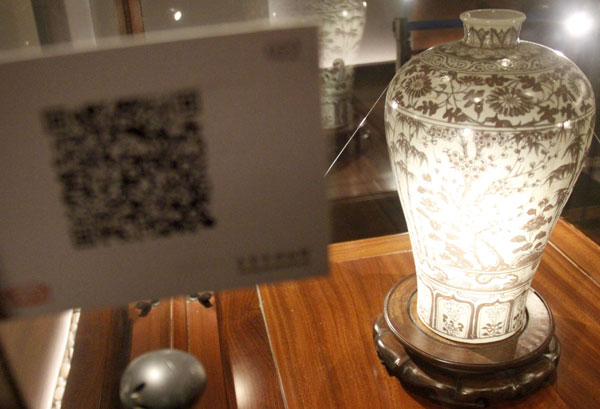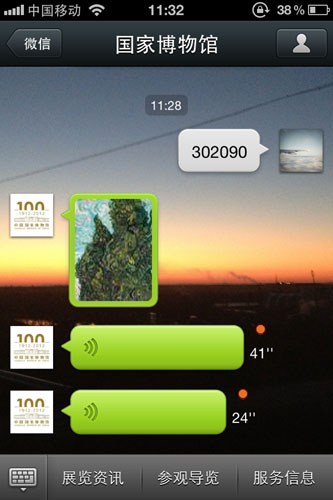Art at your fingertips in museums
Updated: 2013-06-11 07:50
By Liu Xiangrui (China Daily)
|
||||||||
A mobile phone and an app will allow visitors to see famous works in a new modern light. Liu Xiangrui reports.
 |
|
Audiences can learn more than 40 first-class heritage pieces in Nanjing Municipal Museum, by scanning two-dimensional codes with smartphones. [Photo by Dong Jinlin / for China Daily] |
Do you still feel lost before a sea of exhibits with only simple tags to read, in small print, in museums? Fear not, help is at hand.
All you need is a smartphone with an app capable of reading two-dimensional codes.
Recent visitors to the National Museum of China have been busy getting background information by using the codes. With a simple scan, they get a detailed explanation of the exhibit, either in script or audio form.
The service is receiving a warm reception.
In an exhibition staged from February to May Earth, Sea, and Sky: Nature in Western Art - Masterpieces from the Metropolitan Museum, more than 410,000 scans were conducted, according to the museum.
 |
|
Two-dimension codes and Weixin accounts can easily be found and used in the National Museum of China. [Provided to China Daily] |
In fact, the two-dimensional code for mobile phones is just one of the digital tools employed by the National Museum of China.
The rapid development of digital and intelligent technologies is changing our lives.
"This brings about a whole new viewing experience for our audiences," says Huang Chen, head of the museum's public education department.
A scan of the specific code will link the viewers to a related Internet website where they can immediately get the exhibit's introductory information in multimedia forms.
"By saving the website, we can review the information after we leave the museum; we can also share it with friends on social network platforms like Sina Weibo or Weixin with a click," says Wu Li, a frequent museum visitor from Beijing.
Digital technologies have been helpful in improving the museum's service and enhancing audience experience. Weixin, a popular instant-messaging app marketed internationally as WeChat, is another successful example.
Since the National Museum of China opened a Weixin account six months ago, more than 100,000 have subscribed to its services.
Besides related information, such as the latest exhibitions, the platform includes free audio services for exhibitions.
It only takes the user to type the exhibit's number or name to get information. According to museum statistics, the service on Weixin has been used about 163,000 times for the Nature in Western Art exhibition and has been instrumental in bringing about a surge in visitor numbers.
"The public can still appreciate the exhibits after exhibitions have closed," Huang says.

 Michelle lays roses at site along Berlin Wall
Michelle lays roses at site along Berlin Wall
 Historic space lecture in Tiangong-1 commences
Historic space lecture in Tiangong-1 commences
 'Sopranos' Star James Gandolfini dead at 51
'Sopranos' Star James Gandolfini dead at 51
 UN: Number of refugees hits 18-year high
UN: Number of refugees hits 18-year high
 Slide: Jet exercises from aircraft carrier
Slide: Jet exercises from aircraft carrier
 Talks establish fishery hotline
Talks establish fishery hotline
 Foreign buyers eye Chinese drones
Foreign buyers eye Chinese drones
 UN chief hails China's peacekeepers
UN chief hails China's peacekeepers
Most Viewed
Editor's Picks

|

|

|

|

|

|
Today's Top News
Shenzhou X astronaut gives lecture today
US told to reassess duties on Chinese paper
Chinese seek greater share of satellite market
Russia rejects Obama's nuke cut proposal
US immigration bill sees Senate breakthrough
Brazilian cities revoke fare hikes
Moody's warns on China's local govt debt
Air quality in major cities drops in May
US Weekly

|

|







